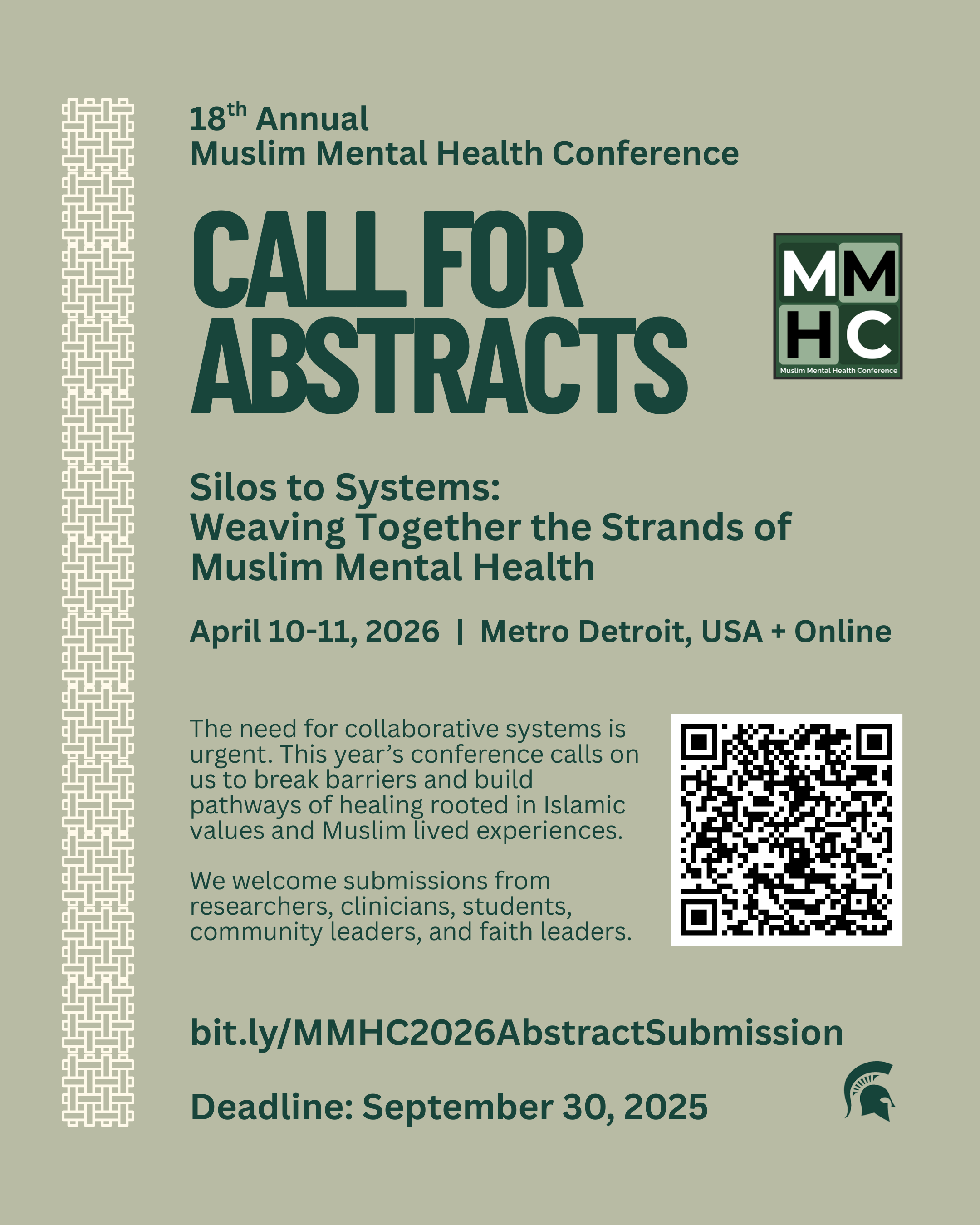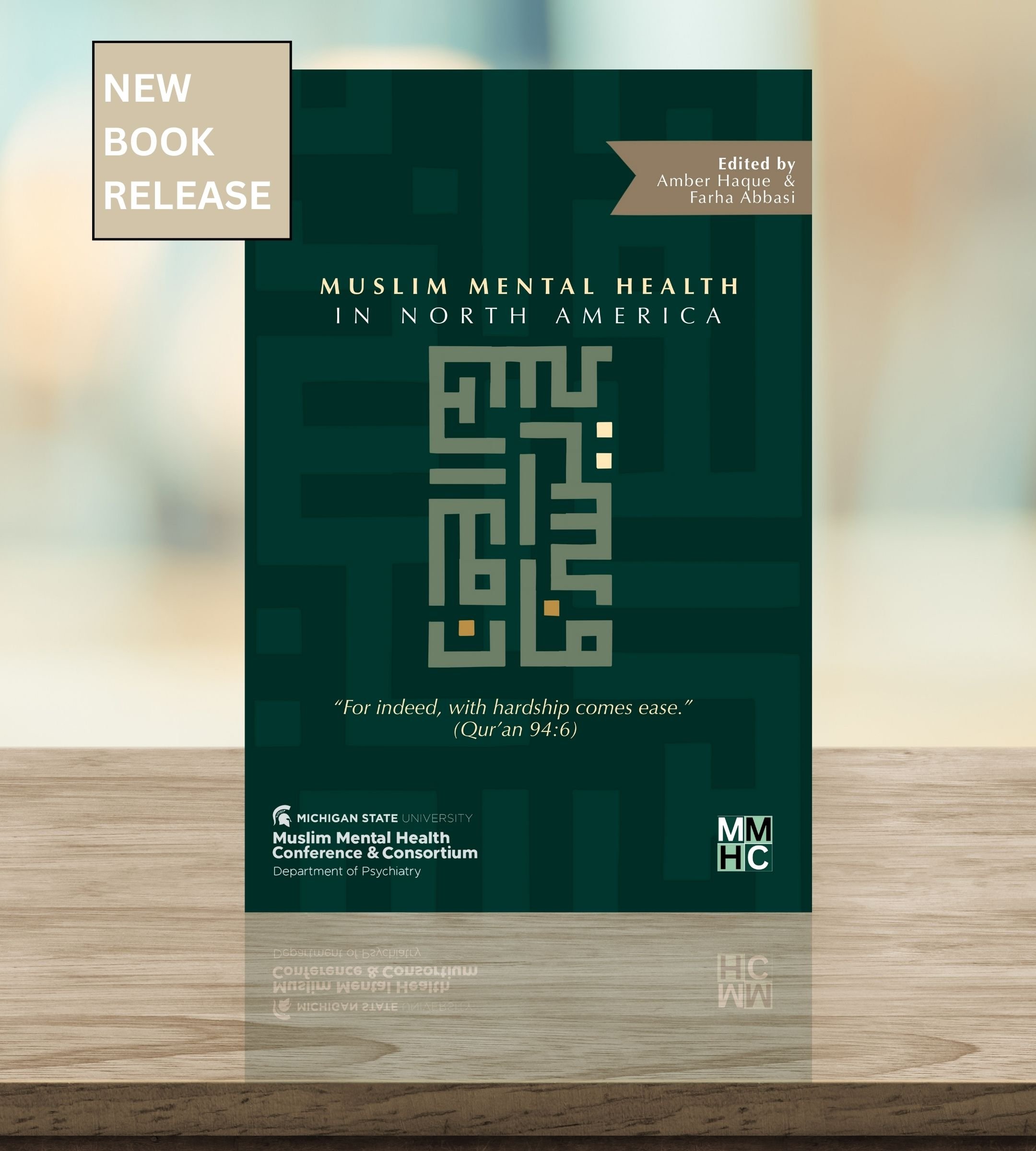Abstract Determinations Announced
How to know if your abstract was accepted?
Thank you to everyone who submitted abstracts for the 18th Annual Muslim Mental Health Conference! If you submitted one or more abstracts, you should have received an email notifying whether your abstract was accepted.
You can also log into the Whova app to check the status of your abstracts here.
If you submitted your abstract together with another co-presenter, please also be sure to check with them incase they received the determination letter.

Present at MMHC
***Thank you to everyone who submitted their work to present at MMHC 2026. The Call for Abstracts for the 18th Annual Muslim Mental Health Conference is Now Closed***
The 18th Annual Muslim Mental Health Conference welcomes abstract submissions from anyone working to support Muslim mental health, including:
- Researchers & academics sharing new insights
- Clinicians & practitioners advancing therapeutic care
- Students & trainees growing their scholarship
- Community leaders & advocates creating impact on the ground
- Faith leaders & chaplains guiding holistic well-being
We believe every perspective enriches this space, and we invite you to bring your voice, your work, and your vision.
What We're Looking For
As the global mental health landscape evolves, the need for cohesive, collaborative systems has never been more urgent. The 18th Annual Muslim Mental Health conference theme, Silos to Systems: Weaving Together the Strands of Muslim Mental Health, calls on us to break down disciplinary, institutional, and ideological barriers to create integrated pathways of well-being, healing, and care rooted in the lived experiences of Muslim communities and Islamic tradition.
We seek abstracts related to mental health from clinical practitioners, researchers, and those engaged in community work/policy. We welcome proposals from diverse disciplines, including, but not limited to, social work, counseling, psychology, psychiatry, psychotherapy, health technology, law, history, Islamic studies, Islamic psychology, chaplaincy, and community workers.
We invite participants to explore how Muslim mental health initiatives can be enriched by efforts aimed at collaboration, sustainability, transformation, and growth. Together, we will amplify efforts, in theory and praxis, to bridge silos and build responsive systems that center equity, dignity, spiritually grounded frameworks, and holistic care.
We seek abstracts that address, but are not limited to, the following questions:
How can we design and implement integrative models of care that effectively weave together interdisciplinary (e.g., spiritual, social, political, medical, and psychological) frameworks to create more cohesive and accessible systems of healing for Muslim communities?
What are effective strategies for fostering intra-community and interdisciplinary collaborations that bridge existing silos and support collective healing within Muslim communities?
What theoretical and practical lessons can we draw from Islamic Psychology about building and integrating systems in Muslim mental health?
How can advocacy at the systems level—including data collection, community organizing, securing funding, and promoting policy reform—contribute to breaking down barriers and building more responsive and equitable systems of care for Muslim communities?
What approaches can cultivate trauma-informed faith spaces, ensuring psychological safety, well-being, and integrating mental health awareness within mosques and other community settings to build more holistic systems of support?
How can we build and sustain community collaborations and partnerships between grassroots organizations and initiatives that lead to greater system change?
GUIDELINES FOR SUBMITTING PROPOSALS
The deadline to submit proposals is September 30, 2025. All proposals should include a 300-word abstract and one to five learning objectives. Guidelines for writing learning objectives can be found here.
The Call for Abstracts is now Closed for the 18th Annual Muslim Mental Health Conference.
Thank you to everyone who submitted abstracts. We are truly grateful for your hard work and contributions.
For next steps and key dates regarding the Abstract Submission and Review Process, please see the information below:
| Important Milestones | Date |
| Abstract Submission Portal Opens ***NOW CLOSED*** | July 31, 2025 ***NOW CLOSED*** |
| Abstract Submission Deadline ***NOW CLOSED*** | September 30, 2025 ***NOW CLOSED*** |
| Notification of Acceptance | Announced. Click Here to View your Submission |
| Presenter Confirmation Deadline | January 16th, 2026 |
| MSU COI Disclosure Deadline | January 16th, 2026 |
| Presentation Upload Deadline | April 1st, 2026 |
| Online Poster Presentation Upload Deadline | April 3rd, 2026 |
| Conference Dates | April 10-11, 2026 |
MSU programs and activities are not restricted based on race, sex, color, ethnicity, national origin or other protected personal identity. This conference is open to all mental health practitioners, religious leaders, faculty, graduate students, and community organizers and members.
